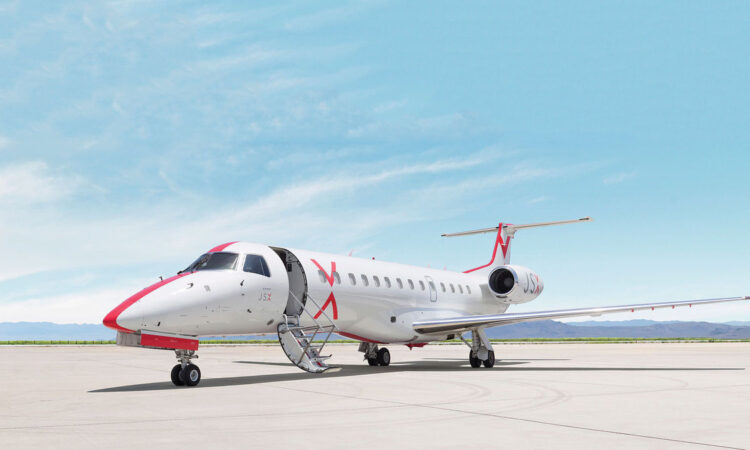JSX, a small but growing semiprivate airline, is positioning itself as the David to American Airlines’ Goliath in an unfolding drama that could threaten not only JSX but other operators in the semiprivate sector.
American, joined by prominent airline unions, is pushing the U.S. Department of Transportation (DOT) to prohibit JSX from doing business under its current charter model.
Semiprivate airlines, often operating under regulatory approval as a public charter, resemble private carriers by operating out of private airport terminals with small planes. The maximum number of seats allowed by the FAA for public charters is 30. Cabin interiors offer plenty of legroom. Because they use small terminals that don’t require TSA checkpoints, customers only have to arrive about 15 to 30 minutes before their flight.
However, semiprivate carriers resemble large commercial airlines by offering regular flight schedules with published ticket prices that tend to be similar or somewhat higher than first-class domestic seats but far below private prices.
JSX is the biggest such operator in the U.S., serving 23 airports, according to its website, and 43 routes, according to a June public filing. Tradewind Aviation, Aero and Tailwind Air are examples of other U.S. semiprivate operators.
American, the Air Line Pilots Association (ALPA) and other major industry unions argue that JSX presents a security risk because it does not have to comply with the same TSA screening standards as operators flying out of commercial airports. The unions also say that public charters compromise U.S. aviation safety because pilots are not subject to the same 1,500-hour flight-training rule as standard commercial carriers.
American and the unions began their push against JSX after SkyWest Airlines applied to operate charter commuter flights. Though its business model would differ sharply from JSX, SkyWest Charter would operate those flights under the same public charter authority as JSX.
In a May 16 letter addressed to the DOT, American’s head of regulatory affairs, Molly Wilson, accused JSX of exploiting a regulatory loophole to fly its regularly published schedule.
“American believes that the ‘scheduled charter’ model, as leveraged by JSX, degrades our nation’s aviation system and distorts competition,” she wrote. “DOT should end this misuse.”
Using the SkyWest docket as a forum, ALPA warned that the JSX business model is expanding so rapidly that it could encompass a large portion of U.S. air service.
“If it looks, swims and quacks like a duck, it is a duck,” the union wrote in a July filing. “Since JSX does in fact provide scheduled service, it should be deemed to do so, regardless of the fictitious regulatory disguise that it dons.”
JSX answers its critics
JSX said it is in full compliance with federal regulations and is not taking advantage of any loophole.
“The public charter regulations have been in existence for 45 years. The long-standing policy objective behind those regulations is to promote a broader diversity of air service options for U.S. consumers in a liberalized marketplace, with a regulatory focus on consumer protection,” the carrier wrote in a public filing.
JSX also touted its passenger-screening procedures, which it noted comply with TSA requirements, and said that its captains average more than 8,000 hours of flying experience, while its co-pilots average more than 3,700 hours.
Dallas-based JSX took specific aim at its Big Three neighbor American, saying the carrier’s true motivation is to quash competition.
“American’s letter is, in fact, a cynical attempt to manufacture a regulatory controversy where none exists in the hopes of spurring government intervention to protect American’s Goliath from competition from JSX’s David, especially at American’s hometown of Dallas,” the carrier wrote.
JSX is not alone in defending its model. JetBlue, which owns a small stake in JSX, dismissed the positions of American and the labor unions as self serving in a June public filing.
“JetBlue urges DOT to ignore these blatant protectionist attempts and to unequivocally adhere to its long-standing, safe and successful public charter rules,” wrote senior vice president of government affairs Robert Land.
American’s efforts called anti-consumer
Gary Leff, an aviation industry analyst who authors the View From the Wing blog, said that if America’s push is successful, flyers would be the ones who lose out.
“It would mean less innovation in business models and products for customers, and it would mean less service between airports that don’t otherwise have it,” he said.
Leff also argued that ALPA’s true motivation is to maintain bargaining leverage for its members by blocking avenues that sidestep the 1,500-hour training rule.
“ALPA doesn’t want air carriers providing service outside the scope of the restrictive rules that prevent entry into the profession, and American doesn’t like a premium, Dallas-based carrier that can use private terminals,” he said.
Source: Read Full Article
